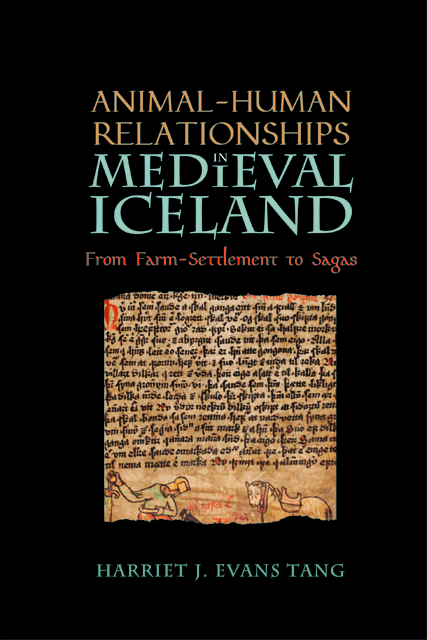Book contents
- Frontmatter
- Dedication
- Contents
- List of Illustrations
- Acknowledgements
- Note on Translations
- The Animal Acts …
- 1. An Animal-Human Settlement
- 2. Home, Sweet Home: Meeting Points on the Animal-Human Farm
- 3. The Animal-Human Community: Legal Tradition in Iceland
- 4. Fostering Relations: The Animal-Human Home in the Íslendingasögur
- 5. The Negative Animal: Absence, Precarity, and Danger
- … And the Man Responds
- Bibliography
- Index
- Nature and Environment in the Middle Ages
The Animal Acts …
Published online by Cambridge University Press: 11 January 2023
- Frontmatter
- Dedication
- Contents
- List of Illustrations
- Acknowledgements
- Note on Translations
- The Animal Acts …
- 1. An Animal-Human Settlement
- 2. Home, Sweet Home: Meeting Points on the Animal-Human Farm
- 3. The Animal-Human Community: Legal Tradition in Iceland
- 4. Fostering Relations: The Animal-Human Home in the Íslendingasögur
- 5. The Negative Animal: Absence, Precarity, and Danger
- … And the Man Responds
- Bibliography
- Index
- Nature and Environment in the Middle Ages
Summary
Ok er hestrinn kemr fyrir dyrr, hneggjaði hann þá hátt.
And when the horse came in front of the door, then he neighed loudly.
There is a scene in Hrafnkels saga Freysgoða, famous among saga scholars, in which a horse and a man communicate, and more than one person dies as a result. It is a remarkable moment in which the horse, Freyfaxi, uses his voice and body to provoke his human into action, and alter the course of the narrative: the animal acts, and the man responds.
On hearing the neigh, Hrafnkell immediately recognises the sound as that of his horse and calls on his serving woman to go to the door. When he eventually ventures out to see Freyfaxi himself, he speaks to the horse, calling him fóstri (foster-kin), acknowledging that he has been poorly treated, and vowing revenge against the perpetrator of the ill-treatment. He tells Freyfaxi to return to his followers, and Freyfaxi understands the command, returning to his pasture and his stud-mares. Although the episode may seem quite remarkable to a modern reader, the wording of the episode, Hrafnkell’s initial casual response and immediate recognition of the neigh suggests something mundane. Hrafnkell seems used to such visits, and this interspecies communication may have been nothing out of the ordinary – but scholarship has often made it out to be so. Interpretations of Freyfaxi have frequently neglected his status first and foremost as a horse, and a horse who can act for himself; and Hrafnkell’s reference to his horse as fóstri can be read simply as an expression of affection for a favoured animal. It is, however, a relationship beyond affection. Freyfaxi is a figure with whom communication and mutual understanding can take place, he is a foster-kin to Hrafnkell and is punished for his actions. In the relationship between Hrafnkell and Freyfaxi we see action and response, sociality and obligation: an animal participating in ‘human’ social networks – or perhaps the ‘human’ nature of these social obligations breaking down. Freyfaxi is loud and provocative and does more than simply provide a way for the saga compiler to demonstrate Hrafnkell’s immoderate behaviour.
- Type
- Chapter
- Information
- Animal-Human Relationships in Medieval IcelandFrom Farm-Settlement to Sagas, pp. 1 - 22Publisher: Boydell & BrewerPrint publication year: 2022



